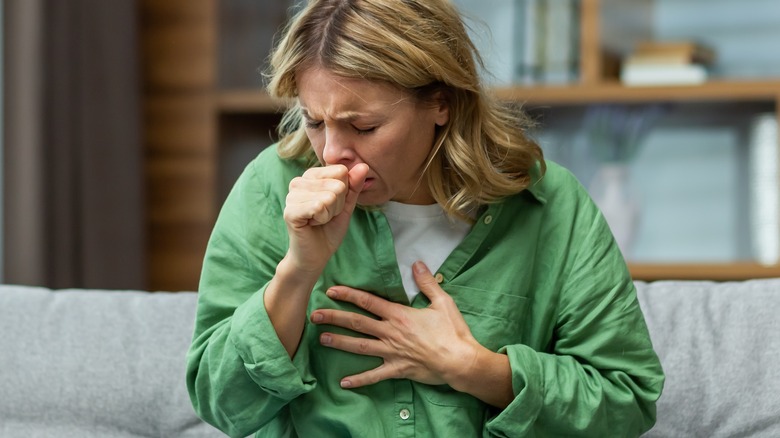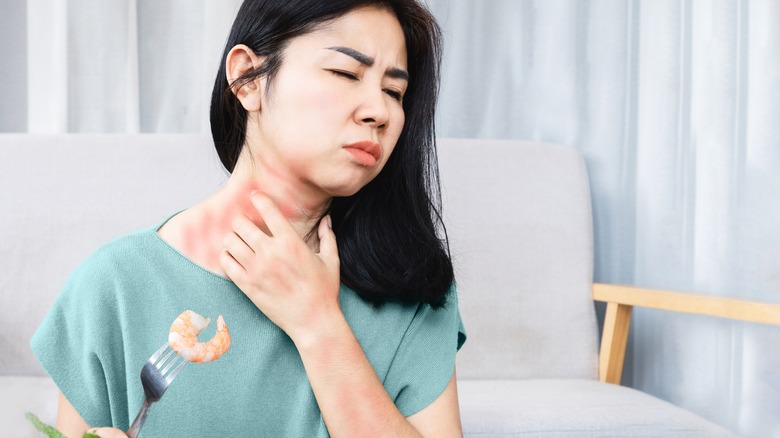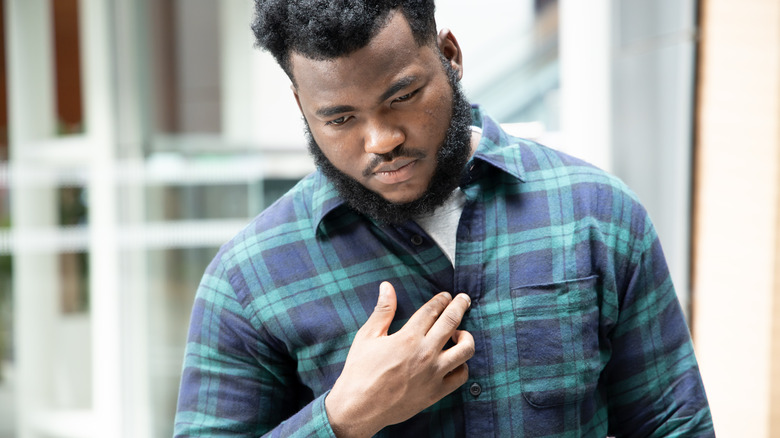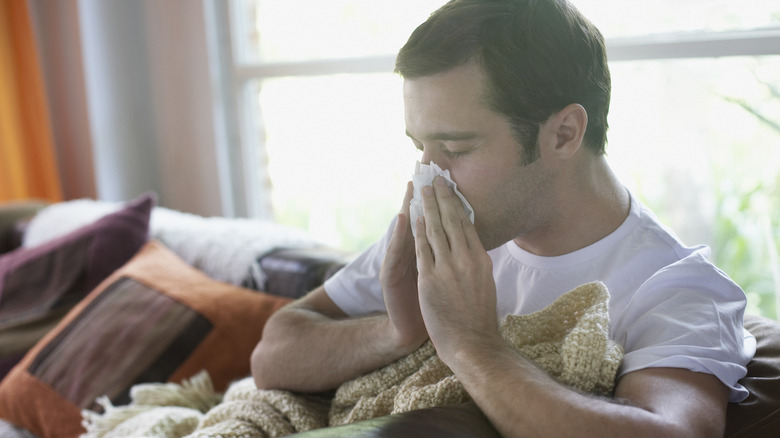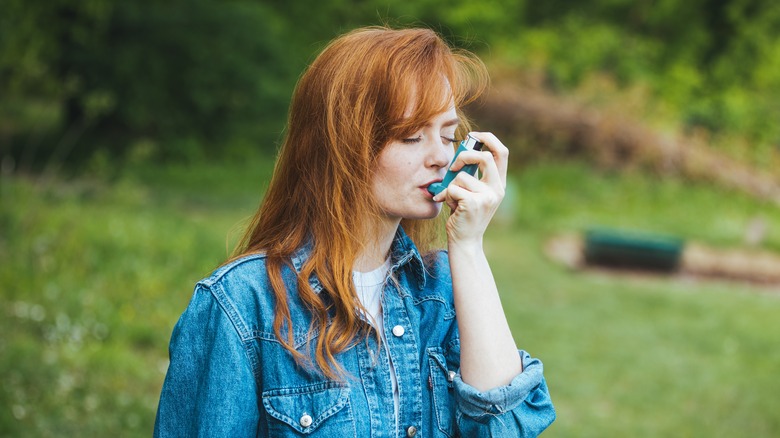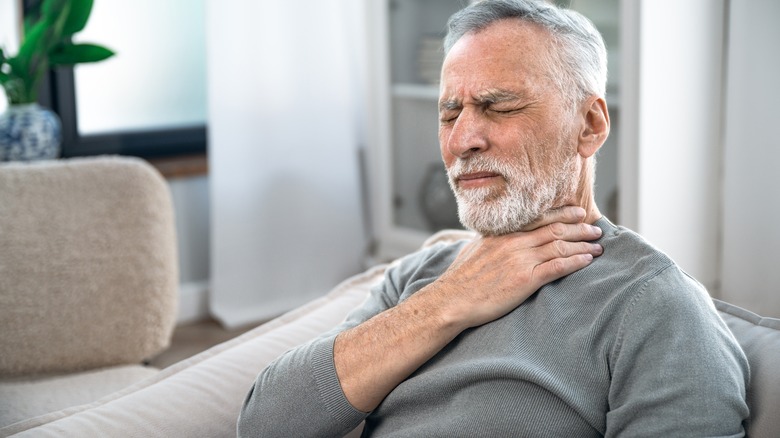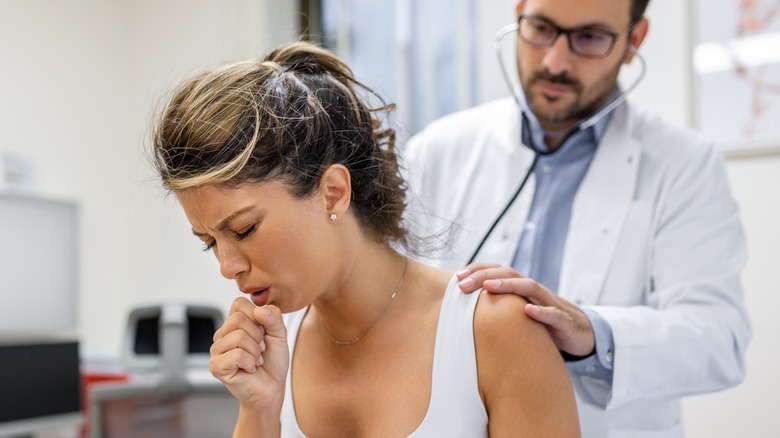What It Means When You Have A Coughing Fit After Eating
Many people have food go down the wrong tube, which leads to a coughing fit. However, some people experience coughing after eating specific foods. For example, Haym Salomon Home for Nursing and Rehabilitation states that greasy and fried foods, gluten, alcohol, and sugar might make you produce more phlegm. Coughing isn't inherently bad, though.
The American Lung Association notes that coughing is a spontaneous reflex triggered by mucus, dust, or irritation in the airways. An occasional cough, even after eating, is normal and your body's way of removing something it doesn't like. For instance, a chip might have hit your throat just the right way to create irritation. But coughing every time you eat might mean that something bigger is going on with your body, like food allergies, asthma, GERD, aspiration pneumonia, respiratory infection, and dysphagia.
Build your knowledge of these different conditions and how they could affect your cough. We'll also walk you through the treatment options available to soothe your cough.
Coughing after eating signals food allergies
According to the U.S. Food and Drug Administration (FDA), millions of people in America have experienced a food allergy. Typically, these only produce mild reactions, but they can be life-threatening for some. While medications and treatments are available for food allergies, there is no cure for them.
The American College of Allergy, Asthma, and Immunology (ACAAI) states that food allergies are most common in children but can appear at any age. Medically speaking, a food allergy is when your immune system overreacts to a specific food, triggering a response. Eight foods account for approximately 90% of reported allergic reactions: eggs, dairy, peanuts, tree nuts, fish, shellfish, wheat, soy, and sesame. Those who encounter a food allergen may experience various symptoms like coughing, shortness of breath, hives, wheezing, swelling, and gastrointestinal issues. The reaction typically occurs within a few hours of encountering the food, but can only take a few minutes with severe allergies. Severe allergies can lead to constriction of the throat and shock, requiring emergency medical attention.
The Mayo Clinic notes that it's essential to avoid the food once an allergy has developed. This means checking labels because foods like soy can easily be slipped in. Seeing an allergist can help you narrow down food allergies. However, exposure therapies are available to help those with severe reactions to specific kinds of food. It's also helpful to expose children early to prevent specific food allergies from developing.
GERD creates a cough after eating
You've probably heard of gastroesophageal reflux disease (GERD) or acid reflux, in which the stomach's contents go up into the esophagus. It can leave you with a bitter taste in your mouth, chest pain, and a sore throat. But coughing after eating can be another sign that GERD is affecting your life.
"Nighttime coughs or coughing after meals are signs associated with reflux-induced cough," explains Dr. David O. Frances in an article published in the journal Gastroenterology & Hepatology. This cough is typically referred to as a GERD cough or GERD-related cough. American Family Physician notes that about 75% of patients with GERD have a chronic cough. This cough is typically dry, since it's not coming from a post-nasal drip.
Relief from a GERD cough requires testing and diagnosis of GERD by visiting your healthcare provider and undergoing an endoscopy. To treat the cough, you need to treat your GERD by taking medications to help treat symptoms like antacids and H2 blockers, per Healthline. Try lifestyle changes to help with your symptoms, like stopping smoking, changing your diet, losing weight, and sleeping with your head up. Eating smaller meals may also help.
Coughing after eating can be due to a respiratory infection
If you've ever had a cold or the flu, you know that a cough is part of the territory. Some upper respiratory illnesses, like Covid-19 and bronchitis, create coughs that are worse than others. These infections affect the way your sinuses, throat, or lungs function, leading to cough, fever, fatigue, sneezing, headache, and sore throat (via the Cleveland Clinic).
All the irritation from the infections makes your throat feel sore and ache. Therefore, eating or drinking can irritate your throat and lungs. It might also break up phlegm caught in your throat, making you cough after eating or drinking. While some medical advice might suggest avoiding milk or dairy because it increases mucus during a cold, the Mayo Clinic refutes this research. In fact, it states that milk and saliva can mix to coat the throat briefly, creating the phlegm-like feeling.
Upper respiratory infections typically last about seven to ten days but can last longer (per StatPearls). Depending on what's causing the infection, you may need to visit the doctor for a round of antibiotics or antiviral medications. Cold and cough medications can also help reduce your cough after eating.
Asthma can have you coughing after eating certain foods
Breathlessness and wheezing are all asthma symptoms. But coughing after eating is a little-known symptom that people living with asthma experience. Research published in Asia Pacific Allergy examined how coughing after eating relates to the swallowing mechanism. The study looked at 121 asthma patients and found that spicy foods caused 76% of them to cough, while 53% experienced coughing after consuming sour foods. The researchers also observed postnasal drip to be more common in asthma patients with swallowing-related cough.
According to the Centers for Disease Control and Prevention, about 8.7% of people in the United States suffer from asthma symptoms. This chronic condition creates narrow and inflamed airways, which make it hard to breathe, according to the National Heart, Lung, and Blood Institute. Several triggers can work to cause an attack, like allergens, smells, dust, fur, weather, and exercise.
It's essential to carry an emergency inhaler to calm an attack. This condition also has no cure, but specific treatments are available to help manage it. Patients can also use steroids, oral medications, and treatments to make breathing easier, per the World Health Organization.
Dysphagia includes swallowing difficulties and cough
Dysphagia is a condition that makes swallowing difficult and even painful. Those with dysphagia experience the feeling of food being stuck in the throat, drooling, hoarseness, heartburn, coughing after eating, and acid reflux. The Mayo Clinic notes that this condition can happen to any age group, but is more common in older adults. Since it can lead to difficulty eating and weight loss, getting proper treatment for the condition is vital.
You need access to many different muscles and nerves to push food from your mouth down your esophagus. Therefore, a neural or motor control issue can cause your throat to not swallow properly. According to the National Institute on Deafness and Other Communication Disorders, this condition can be caused by stroke, Parkinson's disease, cerebral palsy, cancer, head and neck injuries, and mouth abnormalities.
Dysphagia can't be cured, but treatment options are available to manage the condition. For example, speech and language therapy can help individuals learn new techniques for swallowing. Liquid or soft foods can make swallowing easier and safer. Severe problems may require a feeding tube (via NHS Inform).
Coughing after eating happens with aspiration pneumonia
You popped a chocolate-covered cherry into your mouth, which went down the wrong hole. After coughing and gagging for a few minutes, you think everything is fine. However, you develop aspiration pneumonia when the food isn't coughed up. This type of pneumonia involves inflammation and eventual lung infection after food or drinks are breathed in rather than swallowed. In addition to coughing and gagging after eating, this disease affects shortness of breath, wheezing, fever, fatigue, chest pain, and problems swallowing, per Penn Medicine.
Food and drinks are usually coughed back up before they find their way into the lungs. However, according to Cleveland Clinic experts, those who are under anesthesia, have trouble swallowing, or have a weak immune system are more susceptible to aspiration pneumonia than others. Additionally, this condition happens relatively quickly after the food or drinks have entered the lungs, even a few hours later.
A healthcare provider can use chest x-rays, blood tests, and cultures to determine what they're dealing with. They will then prescribe a round of antibiotics to treat the infection. Those who are struggling to breathe may need the assistance of oxygen, steroids, and breathing machines, according to Healthline. Pneumonia is a severe condition that can lead to abcesses and scarring of the lungs if not treated immediately.

